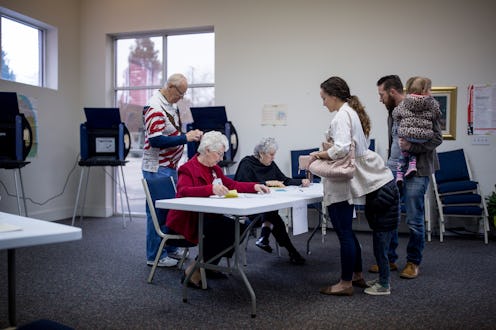News
This Voting Rule In 3 States Should Help Sanders
The April 26 contests — the first Super Tuesday after the April 19 New York Primary — are a crucial follow-up for the candidates, especially those who didn't perform well in the Empire State. For one white-haired candidate in particular, the voting process in some of these states could be in his favor. Voting rules in three states allow 17-year-olds to participate in the primary, which should help Bernie Sanders win Connecticut, Delaware, and Maryland at the end of April, but it won't be easy.
Held across Connecticut, Delaware, Maryland, Pennsylvania, and Rhode Island, these northeastern primaries could determine the fate of certain presidential hopefuls if they manage to sweep all five states. By now, it's no surprise that Sanders has secured the millennial vote; he received 65 percent of the Democratic votes from those ages 18-29 who participated in the New York Primary.
In the United States, 28 states disallow 17-year-olds from participating in their states primaries and caucuses, even if they will turn 18 by the general election in November, according to FairVote. However, among the 22 states that do allow politically-minded teenagers (with a year or less until they are 18) to vote, three of them are holding primaries on the April 26 Super Tuesday.
According to Real Clear Politics data, the early entrance polls have shown Sanders trailing behind Hillary Clinton in all three of these states — Connecticut by 7.5 percentage points, Delaware by 7 percentage points, and Maryland by nearly 22 percentage points. Sanders could close these gaps with the help of young, 17-year-old voters in these states if they participate in primary voting. However, these three states have closed primaries, which will make it harder for Sanders to count on the support of new 17-year-old voters.
Despite these voting rules, in Connecticut it might be more difficult for Sanders to pull off a win against Clinton. Similar to New York, Connecticut holds a closed primary, which limits the number of independent voters from participating. And independent voters have been crucial to Sanders' campaign; in New Hampshire, for example, he won over independents by nearly 50 percentage points.
But with Connecticut's closed primary, as well as the state's deadlines to register and to change party affiliation (three months ahead of the primary), the 17-year-old voters might not be able to help Sanders in the Constitution State if they didn't register to vote. Although current data on registered 17-year-old voters in Connecticut cannot be found, in 2012 — the first year that these teenagers were allowed to vote in the primary — 2,200 of them registered. This is a sizable number that, if replicated this year, could provide a significant number of potential Sanders voters.
Delaware also hosts a closed primary, and the deadline to register was April 2. Among the state's registered Republicans, Democrats, and independents, independents make up 23 percent of these registered voters, which means they won't be able to cast a vote for Sanders (or any candidate) in the primary. However, nearly 50 percent of these registered voters are Democrats, according to the State of Delaware Elections System, which could help Sanders win if the Diamond State is feeling the Bern.
Among registered voters 21 and younger in Delaware, 61 percent participated in the 2012 general election, which was comparable to most other age groups that year. If young voters in Delaware turn up for the state's primary in similar numbers to the 2012 general election then Sanders could oust Clinton in this state with the help of millennial voters, especially among 17-year-olds.
In Maryland, a state which Real Clear Politics data have shown Clinton leading Sanders by double-digit percentage points, the state holds a mixed primary. This means that voting rules for Democrats and Republicans are dependent on each party's decision. Unaffiliated voters can vote in the state's primary, despite being independent, but only if they notify the election board six months in advance, according to The Baltimore Sun.
These mixed primary rules could help Sanders in two ways: First, The Baltimore Sun reported that 672,000 voters declined to pick a party in 2015, which was a 57 percent increase from 2005, and Sanders has performed well among independents. Second, young voters are more likely to identify as politically independent (think: those 17-year-olds who can participate in Maryland's state primary). A large number of independent voters combined with young people's propensity to identify as independent (and be able to vote in the state's mixed primary) could really help Sanders pull off a big win in the Old Line State.
In addition to these three states, 17-year-olds can vote in the following states' primaries and caucuses, too: Alaska, Hawaii, Illinois, Indiana, Iowa, Kentucky, Maine, Mississippi, Nebraska, Nevada, North Carolina, Ohio, South Carolina, Virginia, Vermont, Washington, West Virginia, and Wyoming. Only time will tell how Sanders performs in the remaining contests moving forward, and whether the voting rules that allow younger voters to participate will help him win.
